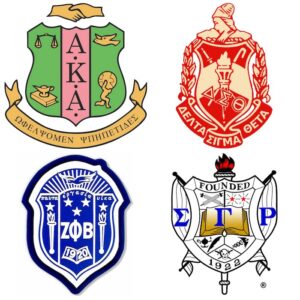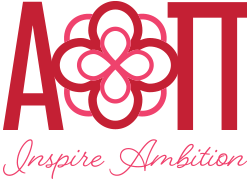Intent
My intentions with this project are to show how important diversity, equity, and inclusion are within sororities, and to break those common stereotypes. I’m hoping this project will show that sororities are not their stereotypes and that there are people with many diverse identities within them. The whole point is to be as inclusive as possible and not only reach out to people within my own sorority but to people in a Black sorority on our campus because they have just as a right to a seat at the table when we’re talking about diversity, equity, and inclusion. I hope to show a nuanced portrayal of these people and their voices who are explaining why DEI means a lot to them being in a Greek letter organization. There are a lot of negative stereotypes that have followed sororities for many years, and I want to show that sororities are not all the same and that DEI plays an integral role in shaping these chapters.

Crests of the Black sororities
Impact
As I discussed above, I’m hoping the impact of this project all works out by being coherent and transparent about how I’m displaying these interviews. For there to be an impact, I have to work towards designing the platform I plan on using, which is a WordPress site and a Youtube Channel to upload the videos on which hopefully will attract engagement. My goal is for people who are in sororities to resonate with the interviewees who are sharing why DEI is so important to them being in Greek-letter organizations and to see that they are not the stereotypes they’re made out to be. There is much more to sororities than people initially realize.

Logo of my sorority
Best and Worst-Case Scenarios
Best
I’m able to coherently articulate through the interviews I plan to conduct about why DEI is important to them being in a sorority and to show that they are more than the stereotypes that have been attached to them. I hope to be able to show that diversity, equity, and inclusion are important principles in these sororities because they are unique in their own ways and are proud of this diversity and being inclusive to people of all identities.
Worst
I am worried that I won’t get enough support and participants to partake in the interviews and that people won’t want to discuss this topic. Diversity, Equity, and Inclusion can definitely be political, which is the main concern that people will be afraid to talk about why it means so much to them out of fear they’ll get criticized for it. Talking about your identity isn’t easy for a lot of people, especially if you’re closeted or you’ve been bullied for it in the past.
Personal Identity
Being in a sorority myself helps make the project personal to me because it’s what I already have prior knowledge of, especially because we introduced a new DEI chair in our chapter almost two years ago. The founding principles of my sorority are also based on diversity, equity, and inclusion. I also served on the DEI committee last Spring alongside the VP of DEI. However, I do understand I come from a privileged background, and I need to be mindful of how I design this project and put it all together in order to ensure everyone gets a fair chance of having their voice heard and I’m also not acting like a savior by how I’m boosting these voices. Going back to what Project Inkblot said, it’s important to be aware of who you may be excluded as well as the common pitfalls of designing such as “believing you’re the expert” which I don’t want to do. Everyone has their own expertise on this subject and it should be shared equitably.
Missing Perspectives
The perspective I need to consider I’m missing could be people of other identities such as LGBTQA and POC when conducting these interviews — more specifically within my own sorority since a lot of us are white and I don’t want all the participants to be the same. It’s also important to consider people from other chapters of my sorority from different universities and Black sororities because DEI is so widespread and everyone has their own personal thoughts on it and how it affects their participation within their sorority. But it all comes down to time constraints and if I can even get enough people to consent to be interviewed about this subject. It’s also difficult to reach out to people in these other chapters because of time and the method of how these interviews would be done since they would be online.
Emphasizing Inclusivity
My hopes to make my project more inclusive are to reach out to people of varying identities in my sorority’s chapter since diversity is the main focus. I would like to have interviewees who are all diverse in order to show that sorority life is not the stereotype where everyone looks the same and are exclusive to certain identities. I would also hope to be just as inclusive when reaching out to a Black sorority on campus and to see the variation and how important DEI is regardless of what sorority you belong to.
February 22, 2022 at 7:06 pm
Meghan,
I really appreciate how intentionally you are thinking about this project, especially considering what you intimate here (but said in class) about being perceived as a white savior and also about not positioning yourself as an expert (that reminds me about c-creation).
I want to caution you about present your sorority’s founding values, which, from what I can tell (at https://www.alphaomicronpi.org/about/values/) don’t mention inclusion and diversity at all. Yes, I see the robust diversity and inclusion efforts that are not taking place, and of which you have played a role in at SJU. But, those efforts are not (at least according to the web site) not “founding principles.” So, you’re going to want to be careful how you present this material throughout the project.
Are you planning on conducting the interviews online or in person and presented online? You write the “method of how these interviews would be done since they would be online,” which gave me pause.
Perhaps we should meet at some point soon to talk about your recruitment approach and how that is going.
Bill